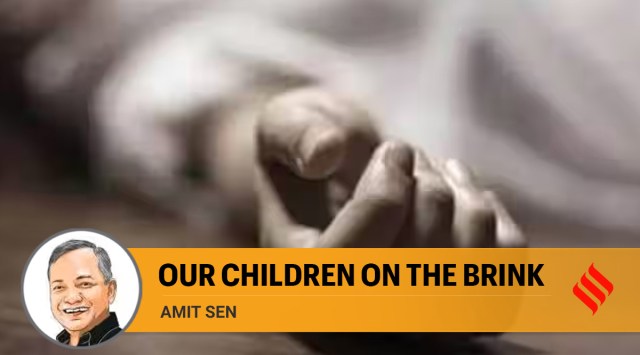
A spate of teenage suicides in Kota, Rajasthan, the mecca of students competing to crack the various entrance exams that will get them their coveted seat in an engineering or medical college, has hit the headlines in the last few days. Amidst celebrations for Chandrayaan 3’s success and the grand preparations for the G20 summit in the capital, this news has raised uncomfortable questions about our ability to understand and look after our young people. Kota, which had already developed a reputation for student suicides in the last decade or more — having lost more than 100 young people in the last 10 years — has seen a sharp rise in its tragic numbers; 23 had died by suicide till August 27. With 100,000 students coming to reside and train at the coaching institutes in Kota every year, these rates of suicide are disturbingly high.
In absolute numbers though, they remain a tiny fraction of the number of young people who kill themselves annually in India. Suicide is the number one cause of death amongst those between 15 to 30 years of age — by far the highest in the world in this age group. The National Crime Records Bureau (NCRB) reported, in 2020, that a student took their own life every 42 minutes; or, in other words, 34 students died by suicide every day. In the same year, 11,396 children below the age of 18 had ended their lives.
And yet, while celebrity suicides become front-page news and farmer suicides become the subject of political slugfests every now and then, the disturbing magnitude of student and youth suicides hardly ever registers in the national consciousness. It’s as if we do not want to face up to this jarring reality that is likely to expose the shameful negligence of our children’s emotional needs and vulnerabilities in our society. Suicide or suicidal behaviour is the culmination of various influences ranging from biological, socioemotional, cultural, political and issues of social justice. For young people, this may reflect in developmental differences, family and parental expectations, the exacting education system they can’t escape, and the othering or marginalisation that some have to face due to their race, religion or socio-economic background. Every time we, as adults, ignore or fail to recognise these intersectional nuances and the profound ways in which they affect our children, we let them down. And these add up, sometimes over months and years, till they reach a point of hopelessness and despair. A mental health disorder might creep in at some point in this trajectory, but it is not an essential precursor of suicidal behaviours.
Going through the tragic stories from Kota this year, I was struck by some common themes. Most of the students come from UP and Bihar, often from lower-middle/middle class backgrounds. Considered the academically bright ones within their schools and communities in small towns, they are catapulted into this gruelling rat race with promises of making it big and the pledge of pulling their families out of their restricted lives and opportunities. Little do they know about the juggernaut that will crush them for the next few years.
The Kota coaching industry is estimated to be worth a whopping Rs 12,000 crore, and one thing that is clear is that it is not interested in student welfare. It is interested in extracting the most out of the thousands of students and their families, both financially and in the form of results; results that will add to their hubris and give them faces to fill the full-page advertisements in national newspapers aimed to attract the next batch of innocent children and ambitious families. They crank up the competition through weekly tests, sending the marks to parents each time, giving more attention to the better performers, and turning a blind eye to kids who slip through the cracks. Hapless students find themselves caught in 12-hour work schedules, seven days a week, with no respite or relief. Away from their families and friends, they have no one to turn to during periods of distress and self-doubt. Neither is there any mechanism to identify and accept individual differences, safe spaces for students to share and support each other, nor any compassionate, benevolent faculty who will take students under their wings. The deep sense of failure, guilt and helplessness spirals out of control for some to a point of no return.
The pandemic has opened up the floodgates of mental health problems across all communities and turned the spotlight on this vastly neglected space of human suffering. While statistics showing depression to be the number one cause of disability in the world were doing the rounds even before Covid-19, there was abject apathy towards mental health conditions in India. The annual budget of the National Mental Health Programme was a mere Rs 40 crore before Covid struck; it has increased more than threefold to Rs 134 crore for the year 2023-24. The Rajasthan government appears to have taken a proactive stance with the crisis in Kota and promises to investigate and find solutions. While these may be welcome changes in the right direction, one thing is for sure — knee-jerk reactions and band-aid solutions like fans with springs, CCTVs and punitive action against scapegoats are not going to bring any lasting change. What is required is a much deeper and continuing engagement with all stakeholders, including parents, educators, pivotal institutions, policymakers, professionals, people with lived experiences and young people who have faced the brunt of these tumultuous times and survived. As adults, we can make a difference, as long as we are able to witness and undertake the journey with our children, and be there when they need us the most.
The writer, a child and adolescent psychiatrist, is co-founder of Children First